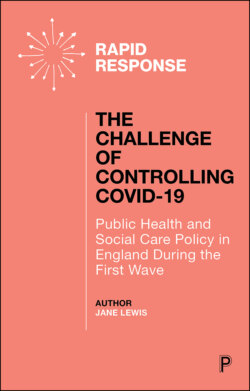Читать книгу The Challenge of Controlling COVID-19 - Lewis Jane - Страница 9
На сайте Литреса книга снята с продажи.
Politicians
ОглавлениеThe UK Government had substantial warning about the new coronavirus and, in broad outline, what they might expect. The first death in China was announced on 11 January 2020, and the first confirmed cases appeared in Italy and the UK at the end of January. The first death occurred in England on 5 March. The World Health Organization (WHO) declared a public health emergency of international concern on 30 January and confirmed the existence of a pandemic on 12 March. By the end of January, it was clear that the virus was being transmitted from person to person, that it had a serious effect on those contracting it, and that there was the potential for it to become a pandemic. Commentators have broadly agreed that the UK Government was nevertheless slow to acknowledge the seriousness of the situation and to respond; the editor-in-chief of the British Medical Journal recorded the verdict of their editorial writers as: ‘Too little, too late, too flawed’ (Godlee, 21 May 2020). However, not all contributions from academics have agreed (for example, Cairney, 2020).
The Government considered that it was well prepared for the pandemic. Prime Minister Johnson made this clear after he chaired his first COBRA1 meeting on 2 March – in fact the fifth that had been held on the new coronavirus – when he said: ‘…let me be absolutely clear that for the overwhelming majority of people who contract the virus, this will be a mild disease from which they will speedily and fully recover … Our country remains extremely well prepared, as it has been since the outbreak began in Wuhan several months ago’ (Johnson, 3 March 2020). However, the opportunity to make preparations during February had been missed. It may be that preparations for Brexit on 31 January absorbed the Cabinet’s attention in January, but in February and early March, it seemed that the Government was inclined to believe, and certainly said, that the virus would be moderate in its effects.
While the UK Government was not alone in the lack of urgency of its response, when compared to countries such as South Korea, Singapore, Germany and Ireland, it was desultory. No objection was raised to holding large sporting events: rugby at Twickenham in the first week of March, when cases rose fivefold and deaths eightfold; horse racing at Cheltenham over four days from 10 March; and football involving Liverpool and Atlético Madrid on 11 March (just as the number of confirmed cases in Spain began to rise steeply). From late January to early March, non-mandatory guidance to self-isolate for 14 days was extended to travellers from designated high-risk countries (China being the first), but these did not include Spain. Nor was any testing or screening carried out. Self-isolation guidance at the borders was abandoned on 13 March and not reinstated until 8 June, when a 14-day quarantine system was announced for arrivals from across the world, although a number of countries (the list changed over time) were exempted on 10 July. Between 13 March and 23 March, when the UK ‘locked down’, the evidence suggests that thousands of new infections were brought into the UK from Europe (HoC Home Affairs Committee, 5 August 2020, para 73).
The Prime Minister continued to behave ‘normally’, shaking hands and attending the Twickenham rugby match in early March. But on 12 March the Government performed a ‘screeching u-turn’, when the PM’s television address admitted that this is ‘the worst public health crisis for a generation … many more families are going to lose loved ones’. This prompts further exploration of the relationship between Government actions and the advice that it was receiving; after all, it insisted from the beginning that it was following the advice of scientists. While the details as to how the Government treated advice – for example, which scientific view was favoured when and why must await an official inquiry (although this will likely be politicised) – it is possible to outline some of the issues and the advice that has since become publicly available. It is also possible to consider further the Government’s pattern of thinking about, and the key dimensions of its approach to, controlling the virus. Politicians were slow to react and much in need of advice on controlling the pandemic, but the relationship with scientists was far from easy.
